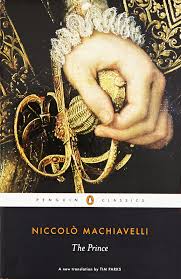The Prince

The Prince by Niccolò Machiavelli (Wikisource) is part of a series of books that I need to read before I can read Collective Choice and Social Welfare. The book started with a promising letter that made me think that the rest is going to be about good governance from a common person’s perspective.
Just as artists who draw landscapes get down in the valley to study the mountains and go up to the mountains to look down on the valley, so one has to be a prince to get to know the character of a people and a man of the people to know the character of a prince.
Reading on, I was a bit disappointed when the author decided to not consider republics. I would have recovered from the disappointment, if things hadn’t taken such a violent turn:
…especially if its people are not used to the freedom of self-government. In that case all you have to do is eliminate the family of the previous ruler and your hold on power is guaranteed.
…in general you must either pamper people or destroy them; harm them just a little and they’ll hit back; harm them seriously and they won’t be able to.
Now I was confused, I had completely misunderstood the motivation of the author. So, I looked up Wikipedia, and for the first time learnt the meaning of Machiavellianism (I remember having ignored this word several times while reading other books and blog posts).
I did not know how to make notes from a book written by someone with such cynical disregard for morality. So, after some thought, I decided to take notes as the prince himself, notes for a violent king.
This is why the visionary who has armed force on his side has always won through, while unarmed even your visionary is always a loser… So when they stop believing in you, you must be in a position to force them to believe.
Cruelty is badly used when you’re not drastic enough at the beginning but grow increasingly cruel later on, rather than easing off… when you take hold of a state, you must asssess how much violence and cruelty will be necessary and get it over with at once, so you don’t have to be cruel on a regular basis.
Favours, on the other hand, should be given out slowly, one by one, so they can be properly savoured.
Love binds when someone recognizes he should be grateful to you, but, since men are a sad lot, gratitude is forgotten the moment it’s inconvenient. Fear means fear of punishment, and that’s something people never forget.
There is nothing more important than appearing to be religious. In general people judge more by appearances than first-hand experience…
But above all a ruler must make sure that everything he does gives people the impression that he is a great man of great abilities.
So a ruler must always take advice, but only when he wants it, not when others want to give it to him. In fact he should discourage people from giving him advice unasked.
This book is disgusting. However, it looks like the exact handbook that some of our current leaders seem to be using. I don’t yet know how, but knowing their strategies can help us counter their actions better.
This was the first book in which I took Amber’s advice of reading the introduction after reading the book and I am glad that I did. Reading it first would have prevented my surprise of discovering the nature of the book. I’ll be adopting this process from now, unless of course I don’t understand the first 100 pages and need the intro for context 😝